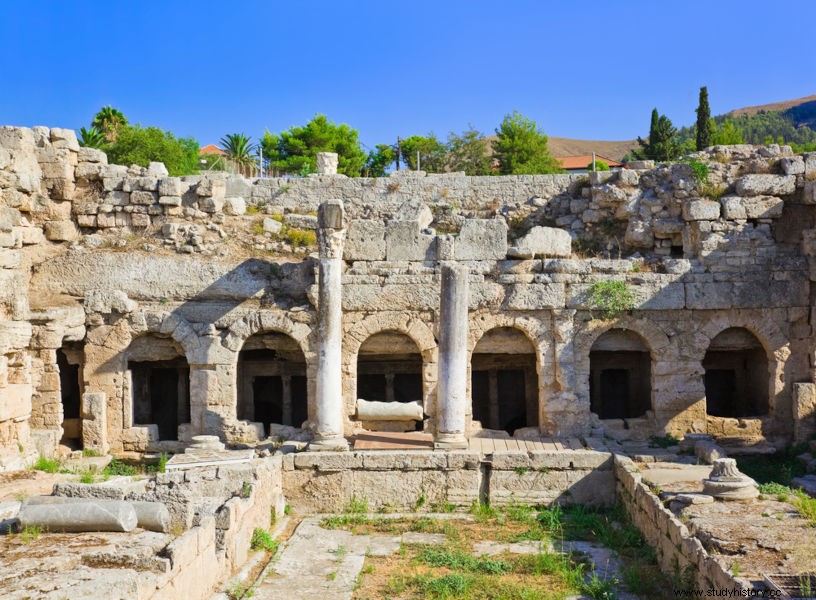
Hermes He was a deity of the ancient Greeks' religiosity and was considered the god of commerce, wealth, luck, fertility, thieves, travel, herds, among others. He was well known for his stealthy abilities, and there are several mentions of his thefts in mythology.
There are mentions of Hermes in Pre-Homeric inscriptions in Mycenaean cities, and it is speculated that he may have arisen in the region of Arcadia. He was the messenger of Mount Olympus and therefore was involved in various myths. Furthermore, he guided the dead to the underworld.
Read more: Dionysus — god of parties, wine, merriment, and theater
Summary on Hermes
-
he was the god of commerce, thieves, travel, among others, for the ancient Greeks.
-
he was stealthy and had a long history of theft in Greek mythology.
-
There are mentions of him in pre-Homeric inscriptions.
-
he was a messenger of Zeus and was always traveling between Olympus and the world of mortals.
-
he took the souls of the dead to the underworld.
Who was Hermes
Hermes was a god that was part of Greek mythology, he was a very peculiar figure and represented commerce, wealth, luck, fertility, thieves, travel, herds , between others. The Greeks understood him as one of their smartest and most intelligent gods, but he was also known to be capable of petty crimes.
Hermes was the patron of animal herders, thieves, diplomats and merchants. He was also the messenger of Mount Olympus, always carrying and bringing messages to Zeus, and still the one responsible for taking the souls of the dead to the realm of Hades, the underworld.
Hermes had winged sandals that allowed him to move at high speeds. He is credited with having created the lyre (giving it to Apollo), fire and the alphabet (to facilitate commercial transactions). Because of its representation in diplomacy, good rhetoric became closely associated with this god.
Origins of Hermes
Historically, the cult of Hermes is known to be quite old, and there is evidence that he was already worshiped by the Mycenaeans in the Pre-Homeric period. We know this because there are short texts in Linear B that mention it.
Mentions of Hermes have been found in places like Thebes and Knossos, and it is believed even though he has surge from in Arcadia (Mainland Greece region) and which was absorbed by the Mycenaeans.
Mythologically, the Greeks believed that Hermes was the son of Zeus and the nymph Maya , and his birth would have taken place on Mount Cilene, in Greece. A few hours after being born, Hermes already demonstrated his skills, learned to play the lyre and made his first theft:he stole cattle from his brother, Apollo.
After that, Hermes managed to hide the cattle, which were found a while later. He was permitted to remain in possession of the animals as long as he surrendered his lyre to his brother, and so it was done. The lyre that Hermes gave to Apollo had been made by himself using tortoise shells.
Read more: Persephone — goddess of agriculture and vegetation, was kidnapped by Hades
Hermes in Greek Mythology
For being the messenger of Mount Olympus , Hermes was involved in several Greek myths. One of them involved Zeus and his wife, Hera. This myth began with Zeus courting Io, the princess of Argos. To prevent his wife, Hera, from seeing him courting another woman, Zeus filled the world with dark clouds. This, however, was to no avail, as Hera went to check what her husband was doing, and when she found him, she saw that he was next to a very beautiful cow.
Zeus, trying to trick his wife, decided to turn Io into a cow, but the trick didn't fool Hera. The goddess then asked her husband to give the cow to her, and he, with no way out, accepted. Then the goddess handed Io over to the giant Argos, known for having a hundred eyes and for never closing all of them, even when she slept.
The situation made Io desperate, and Zeus was distressed to see the princess' suffering. He then mobilized Hermes, giving him the mission to kill Argos so that Io could be rescued. Hermes approached Argos as he watched over Io and distracted him with music and a story. In the end, Argos fell asleep, closed all his eyes, and Hermes was able to decapitate the giant.
This myth ended with Hera stopping chasing Io and regaining her human form. Other passages from Greek mythology evidence Hermes' skill at theft, as he was marked by stealing Poseidon's trident and Artemis' arrows , for example.
Hermes, like many gods in Greek mythology, had a lots of romantic entanglements . He became involved with the goddess Aphrodite, with whom he had a son named Hermaphroditus. He was also the father of Pan, from an involvement with Dryope, and the father of Eudoros, from a relationship with Polymele.
Hermes also participated in the Trojan War, a conflict narrated by Homer in the epic poem Iliad . In this conflict, the god sided with the Achaeans, although he did help the Trojans at specific times. He also got involved with the story narrated in the Odyssey helping Odysseus on his return to Ithaca.
Read more: Greek education in the Classical period — owed much to epic poetry attributed to Homer
Worship of Hermes

According to tradition, Hermes was also worshiped by the ancient Greeks , and his cult was widespread throughout Greece, but especially in the Peloponnese and cities near Arcadia , such as Corinth and Argos. There were temples and shrines in honor of Hermes in different parts of Greece. The Romans too the worshipped him and called him Mercury.
